
History of Pirate Surgeons Menu: 1 2 3 4 5 6 7 8 9 10 11 12 <<First
The History of Sea and Pirate Surgeons, Page 12
Pirate Surgeon Peter Scudamore
The second surgeon captured and tried from Robert's crew was Peter Scudamore. We started with a quote from him, so let's finish the article with him. For, if we want a template for the true pirate surgeon, Scudamore would be our man.
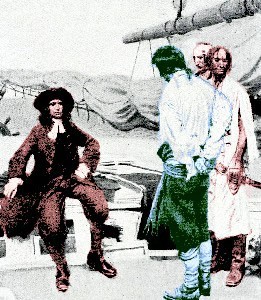
Artist: Howard Pyle (1901)
According to the testimony of Harry Glasby, Jo. Wingfield and Nicholas Brattle, Scudamore volunteered to join the pirates. You may recall from the first page that he boastfully signed the pirates articles, proclaiming himself to be a the first surgeon to do so, whatever the outcome. At his trial, he sang a less ebullient tune, claiming to be "a forced Man from Captain Rolls, [in Calabar, which is Nigeria today] in October last... [claiming that] both Roberts, and Val. Ashplant, threatened him into signing their Articles, and that he did it in Terror."1
Although he claims the pirates forced him from Captain Rolls, he seemed to bear a great deal of ill will for his former captain. At one point, Captain Rolls was leaving the pirate ship in his boat when a tornado arose. The testimony of Glasby, Winfield and Brattle maintain that Scudamore said "I wish… the Rascal may he drowned, for he is a great Rogue, and has endeavoured to do me all the ill Offices he could amongst those Gentlemen, (the Pyrates.)"2 Not only does this show his animosity, it also reveals him to be a kindred spirit to the pirates – something the court no doubt took into account when forming their opinion.
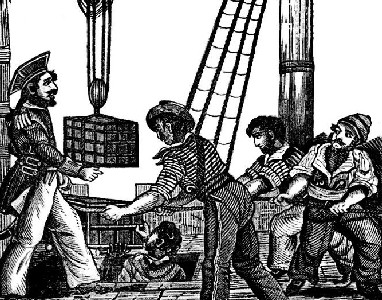
From The PIrate's Own Book by Charles Ellms (1837)
Scudamore was also charged with stealing medicines, medicine chests and other items out of different ships the pirates took, as has been mentioned. We have some detail of what he took from one of them. "Captain Jo. Trahern, and George Fenn, his Mate, deposed, the Prisoner to have taken out of the King Solomon, their Surgeon's capital Instruments, some Medicines, and a Back-Gammon Table, which latter became the Means of a Quarrel between one Wincon, and he, whose Property they should be, and were yielded to the Prisoner."3 A set of capital instruments would be a full set that included those "sufficient for most procedures".4 He also is blamed for abducting Adam Comry, the Elizabeth's surgeon and trying to convince him to sign the articles and join the pirate crew.
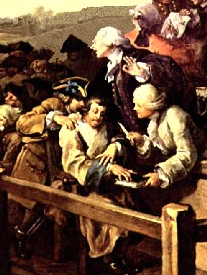
Artist: William Hogarth
Humours of an Election
(1754)
A rather interesting (and wry) look at Scudamore's standing amongst the pirates is revealed when the topic of the election of the Chief Surgeon for Roberts' fleet came up. George Wilson was hoping to get it for the money, as mentioned previously. Scudamore's motives are not revealed, but he won the position "by the good Will of the Ranger's People, who, in general, voted for Scudamore, to get rid of him, (the chief Surgeon being always to remain with the Commadore.)"5 It's not much of a recommendation of your surgical skills when the crew of your ship votes you to a higher position just to get you away from them.
What really seems to have tipped the scales of justice against Scudamore was his attempt to mutiny the small crew of pirates – "some of the Pyrates Negroes, three or four wounded Prisoners, and Scudamore, their Surgeon"6 – who were put aboard the Royal Fortune after the HMS Swallow had captured them. The court appeared incensed at "the treacherous Design he had formed of running away with the Prize, in her Passage to Cape Corso, though he had been treated with all Humanity, and very unlike a Prisoner".7
Scudamore spoke enough Angolan to communicate his plan and "bring over the Negroes to his Design of
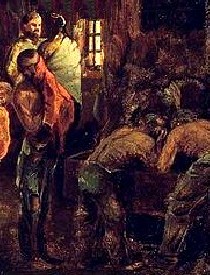
Artist: David Gilmour Blyth
The Rogue a-Plotting
(1863)
murdering the People, and running away with the Ship."8 The other pirates were not keen on the idea, however. One of them, William Child, testified against Scudamore, explaining that Scudamore had been
telling him that once they took the ship "a new Company [could be] raised at Angola and that Part of the Coast, for, says he, I understand how to navigate a Ship, and can soon teach you to steer; and is it not better to do this, than to go back to Cape-Corso, and be hanged and Sun-dryed? To which the Deponent replying, he was not afraid of being hanged [because he wasn't a pirate]."9 Scudamore then told him that if he wouldn't help, he could at least not interfere.
Another prisoner whom Scudamore didn't tell his plan to offered the following testimony. "Isaac Burnet heard the Prisoner ask James Harris, a Pyrate, (left with the wounded in the Prize,) whether he was willing to come into the Project of running away with the Ship, and endeavour the raising of a new Company, but turned this Discourse to Horse-Racing, as the Deponent crept nigher".10
Scudamore was right not to trust Burnet with his mutiny plan because Burnet revealed what he knew of the plot to one of the naval officers, resulting in the crew being armed to prevent any such mutiny.
In response to these accusations, Scudamore said,
As to their Attempt of rising and running away with the Prize, he denies it altogether as untrue; a few foolish Words, but only by Way of Supposition, that if the Negroes should take it in their Heads (considering the Weakness, and ill look-out that was kept,) it would have been an easy Matter, in his Opinion for them to have done it; but that he encouraged such a Thing, was false, his talking to them in the Angolan Language, was only a Way of spending his Time, and trying his Skill to tell twenty, he being incapable of further Talk. As to his understanding Navigation, he had frequently acknowledged it to the Deponent Child, and wonders he should now so circumstantiate this Skill against him.11
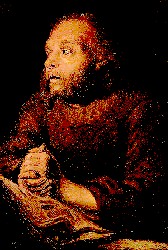
Nevertheless, the court found him guilty of piracy. Following the verdict, Scudamore discovered he didn't like being 'as great a rogue as any of them' as much as he originally thought he might. For Johnson tells us that he
too lately discerned the Folly and Wickedness of the Enterprize, that had chiefly brought him under Sentence of Death, from which, seeing there was no Hopes of escaping, he petitioned for two or three Days Reprieve, which was granted, and for that Time apply'd himself incessantly to Prayer, and reading the Scriptures, seem'd to have a deep Sense of his Sins, of this in particular, and desired, at the Gallows, they would have Patience with him, to sing the first Part of the thirty first Psalm; which he did by himself throughout.12
A fitting end to the second true pirate surgeon and this account of the history of pirate surgeons.
1Captain Charles Johnson, The general history of the pyrates, p. 310; 2Ibid.; 3Ibid.; 4Johnathan Charles Goddard, The Navy Surgeon’s Chest, Journal of the Royal Society of Medicine, April, 2004, p. 313-4; 5Johnson, General History, p. 313-4; 6Ibid.,p. 276; 7Ibid., p. 309; 8Ibid., p. 276; 9Ibid., p. 309-10; 10Ibid., p. 310; 11Ibid., p. 311; 12Ibid., p. 328

